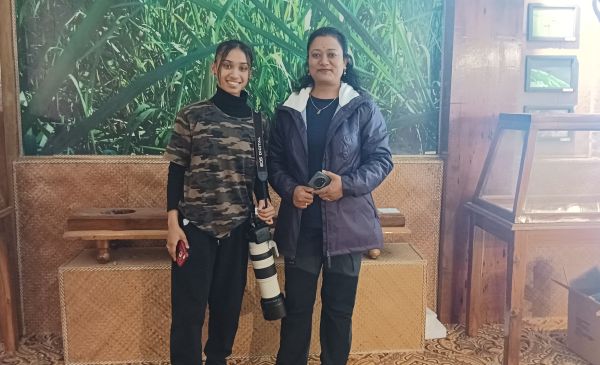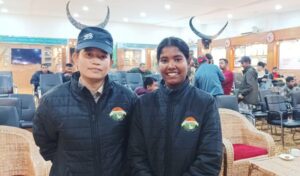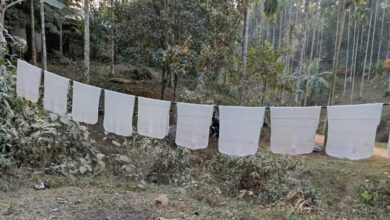Assam women snake rescuers setting an example
Three women, who work privately, are making a change in a field of work that was traditionally a male bastion

 Snake rescuing has traditionally been a male bastion in the North East and other parts of the country. However, a team of three women in Assam is rewriting the script.
Snake rescuing has traditionally been a male bastion in the North East and other parts of the country. However, a team of three women in Assam is rewriting the script.
Ami Rajkhowa Paul (45) was always interested in wildlife, and this led her to photography. Over the years, she became interested in snakes.
Assam has over 70 species of snakes, including some rare ones. However, the expanding human settlement and a lack of awareness of snakes have adversely affected the population of these herptiles.
“I feel snakes are not dangerous but helpless. They cannot see (snakes have poor eyesight and use their tongues to sense their surroundings) and cannot defend themselves. This got me more interested in snakes and I read up to know more about the species. I realised that snakes needed to be rescued as they easily become victims of human ignorance,” Rajkhowa recollected about her journey as a snake rescuer.
Rajkhowa works with an NGO called Wildcare Foundation in Duliajan. She has been rescuing snakes for over five years. “I have rescued over 100 snakes to date and many of those were venomous. I rescue the reptiles and release them in the wild habitat not far from the site of rescue,” Rajkhowa said on the sidelines of a workshop for rescuers in Assam that was held recently in Kaziranga.
Sitting beside her was Rashmita Das, a teenager from Sivsagar who has been rescuing snakes for a few years now. Rashmita is not only the youngest among the three women rescuers but also one of the youngest members in the network of rescuers in the state.
“My father was a rescuer. His work got me interested in snakes. I was never afraid and wanted to do what he was doing. He taught me the nuances of rescuing a snake and I would help him,” said Das, who has rescued about 300 snakes.
Of the three private rescuers in the state, Rajkhowa and Das participated in the workshop held in Kaziranga.
Breaking barriers
Snakes are both feared and revered in India. While they are worshipped in many parts of the country, snakes also become victims of human ignorance and rapid urbanisation.
“People know little about snakes. Hence, they are so scared. I think everyone should read about snakes to know the difference between venomous and non-venomous snakes. The fear of snakes keeps many women away from the rescue work,” said Das.
Fear is not the only reason for women to stay away from snake rescuing. Gender stereotyping has also played a major role in keeping snake rescuing a male-dominated work.

“It is not about skill, strength or courage. It has more to do with society. The social structure is not giving enough space to women in this field of work. But from my experience, I can say that women are best suited for rescue work. This is because rescuing requires patience and hurried work can backfire. Women have patience, which makes them better rescuers than men,” said Guwahati-based herpetologist and researcher Dr Jayaditya Purkayastha, who conducts frequent workshops for rescuers.
Faruk Ali, the founder of Wildcare Foundation NGO in Digboi, said his organisation has 12 rescuers, of whom two are women.
“Lack of awareness about snakes and superstition also keep women away from snake rescuing. But we are making people aware of the different species of snakes and trying to bring in more youths, both male and female, into the rescue work. This will not only help the reptile population to thrive but keep youths away from the present threat of drug addiction in the state,” said Ali, who started the NGO during the pandemic.
Some of the male rescuers, like Subhra Kamal Chaliha, are also coming forward in encouraging women.
Chaliha has been training his wife, Rupjyoti Payeng, for a year now to become a rescuer. “Initially, she would be scared of snakes and the rescue work. But I would tell her about my rescues and the different species of snakes. I would tell her about venomous and non-venomous snakes. This piqued her interest, and she wanted to learn the rescue techniques,” said the 38-year-old rescuer.
Two foresters of Kaziranga National Park, Nangpheseng of Gorajan Range and Malobika Das of Dhanea Range, who were part of the recent snake rescue workshop also had inspiring stories to share.
“All rangers are trained in wildlife rescue, including snakes. It is part of our job. So far, I have rescued a banded krait and a python,” said Nangpheseng, who shared her story during the workshop.
According to Malobika, who has rescued two pythons and a King Cobra, not many women want to rescue snakes because of the fear of snakebites. “But if you know how to handle the reptiles and what to do in case there is a snakebite case, then there is no panic. That awareness needs to be created,” she said.
Challenges
True, these women are doing a commendable job, but their work is not free from challenges. According to Rajkhowa, one of the problems she faces is travelling at night.
“We sometimes get calls at night. Transportation is a major problem, and you need someone to accompany you. If it is a remote area, then it is definitely an issue,” she said.
Another problem that these women, and all private snake rescuers in the state, face is that there is no remuneration or recognition for the work they do.
“No one pays us, and we do not demand money. We intend to save the snake. We fear that if we demand money, then people will not call us and just kill the snake. So, we never ask for money,” she pointed out.
The state government does not have any policy to support these snake rescuers. When asked, a wildlife official said these rescuers are not registered with the department.
Purkayastha has been trying to help the rescuers, both male and female, but he says that any concrete step in the form of a policy is a distant dream.
The private wildlife rescuers are a support system for the government department, and it is thanks to them that there is a growing awareness among citizens.
While these women’s yeoman service is enough to inspire many others, government support in the form of an honorarium will go a long way in encouraging youths to join this field of work.





